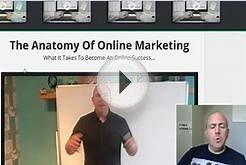The promise of setting your own hours, being your own boss and working in your pajamas is almost too much to resist for many aspiring entrepreneurs. Add to this the low startup costs and overhead, and it's no wonder that so many people choose to start an online business.
But according to some estimates, as many as 90% of Internet startups fail in the first 120 days. And I believe that this is largely because many new business owners don't understand how to effectively market and promote their business online.
Traditional methods of advertising like newspaper ads and Yellow Pages listings can be costly, and only reach a very small, local audience. With most online businesses targeting customers on a national or even international scale, online marketing has become the only real option for reaching their target market.
Following is a simple guide to help you figure out where to spend your valuable time and resources to get the word out about your business and to start driving sales and revenues as soon as possible.
1. Maintain a blog with valuable, quality information
While blogging is important for all types of businesses, it's particularly important for online businesses. Regularly writing blog posts that provide relevant information to your target market not only helps to establish trust and authority with your audience, it drives much-needed traffic to your site.
In fact, according to Hubspot's Marketing Benchmarks report, companies that blog 15 or more times each month receive 5 times more traffic than companies that don't blog. And this traffic ultimately translates into important leads: companies that increase their blogging from 3-5x per month to just 6-8 per month almost double their leads. That's a significant increase in leads for just a few extra blog posts each month.
One of the main challenges I hear from business owners when it comes to blogging is knowing what to write about. They assume they need to write about their products or business, and wonder how much they can really write on these topics. This is exactly the wrong strategy!
Instead, focus on providing solutions to your target market's problems. What are the challenges and issues they face? What do they need help with? How can you help them with these problems? As you continue to provide relevant and valuable information, you'll become a trusted source of information. And when your audience comes to trust you, they'll be more likely to buy from you. Here are some articles that offer more guidance on business blogging:
2. Make sure your website and content are properly optimized for SEO
You don't have to be an SEO expert to understand and implement the fundamentals of SEO. One of the most important ways to get your site ranking in the search engines is to make sure you're using the keywords your target market will be looking for. Once you've decided which keywords to target, you'll want to make sure you use these (where appropriate and relevant) throughout your site, in your:
- URLs
- Title tags
- Heading tags (H1, H2, etc.)
- Alt image tags
- Content
Another factor that's important for SEO is regularly adding new blog posts, and focusing on long-form (1000 word+), 'meaty' content that covers every angle of a topic. Posts that do a great job of being a complete resource on a topic are likely to be popular with your audience, and to receive inbound links from other sites. And getting inbound links is great both for SEO and for driving referral traffic back to your site.
For more guidance on optimizing your business site for SEO, see my articles, The Three Pillars of SEO in 2014 and The Definitive Guide to SEO in 2014.
3. Be active on social media
Maintaining an active presence on social media will be one of the most important ways you reach and connect with your target market and drive traffic to your blog.
As you share interesting content on networking sites like Facebook and Twitter, you experience increased brand recognition and authority and provide a richer customer experience. Interacting on social media also humanizes your brand, and decreases the risks your audience will feel when deciding whether or not to buy from you.
Without social media, your inbound traffic is limited to people already familiar with your brand, or those searching for keywords you currently rank for. Every social media profile you add is another path leading back to your site, and every piece of content you share on those sites is another opportunity for a new visitor. The more quality content you share on social media, the more inbound traffic you'll generate, and more traffic means more leads and more conversions.
For more ideas for your social media marketing, see my articles, The Top 10 Benefits of Social Media Marketing and 100 Killer Ideas for Your Social Media Content.
4. Drive new subscribers to your email list
While Google and social media can be great sources of traffic, the problem is you're always reliant on changes and algorithm updates outside your control. For instance, you could be generating thousands of visitors per month to your site through your Facebook Page, then Facebook could change their timeline algorithm and suddenly none of your fans will see your posts.
For this reason, ensuring you drive your social media followers and website visitors to your email list is imperative. Your email list is the one online asset you truly own, as no one can limit your access to your subscribers.
The best way to convince your audience to join your list is to come up with a compelling offer or asset. This could be a free eBook, webinar, or the promise of discounts or coupons. Whatever you decide to offer, just make sure it's something that your audience will recognize as holding real value.
5. Become a guest on popular sites in your industry
When you blog on your own site, you connect with your current audience. But when you guest blog, you have the opportunity to reach a new audience who otherwise may never have found out about you.
There are other distinct advantages to guest blogging:
- Driving referral traffic to your site
- Aligning your brand with industry leaders
- Building your personal brand
- Establishing yourself as a thought leader in your field
- Generating new leads
A strategy I often recommend before you jump into guest blogging is making sure you have at least 10 amazing pieces of content on your site. This way, when you contact big-name publishers to ask about guest blogging opportunities, they can see what you're capable of providing. Some publishers will also allow you to link to your own content within your guest posts, so having these 10 articles will also give you something valuable to link to.
By understanding and implementing the 5 strategies above, you'll be head and shoulders above most online business owners. Recognizing that offering true value to your audience via blog posts, email and social media content will help you reach and connect with your prospects and generate new leads.












